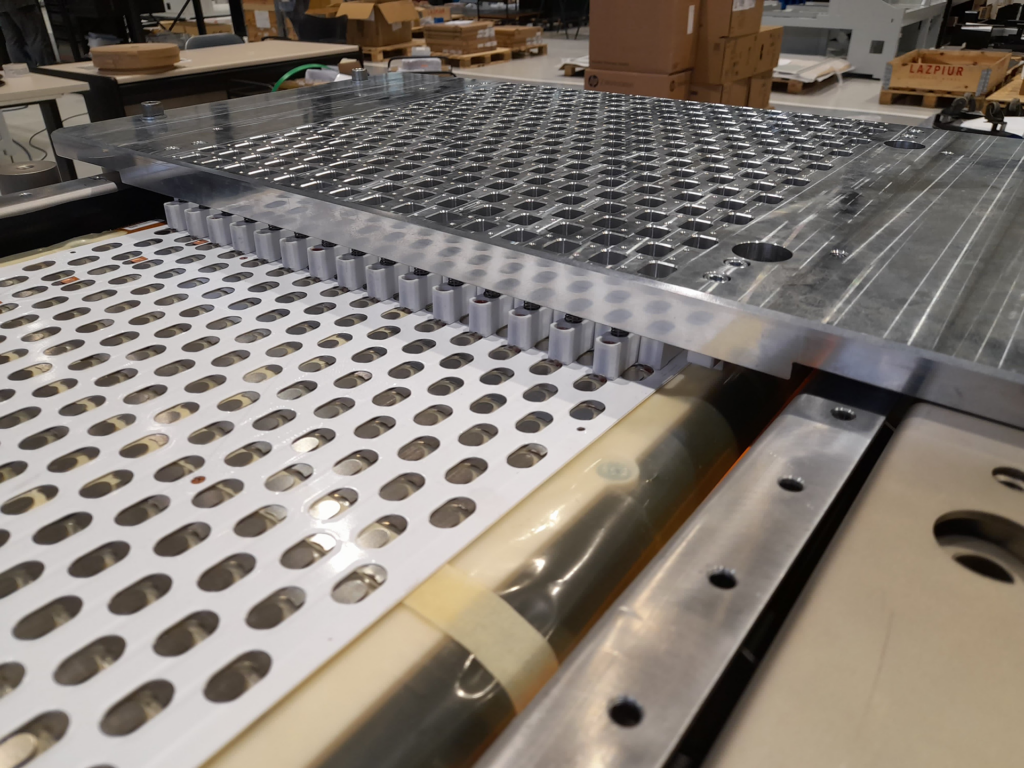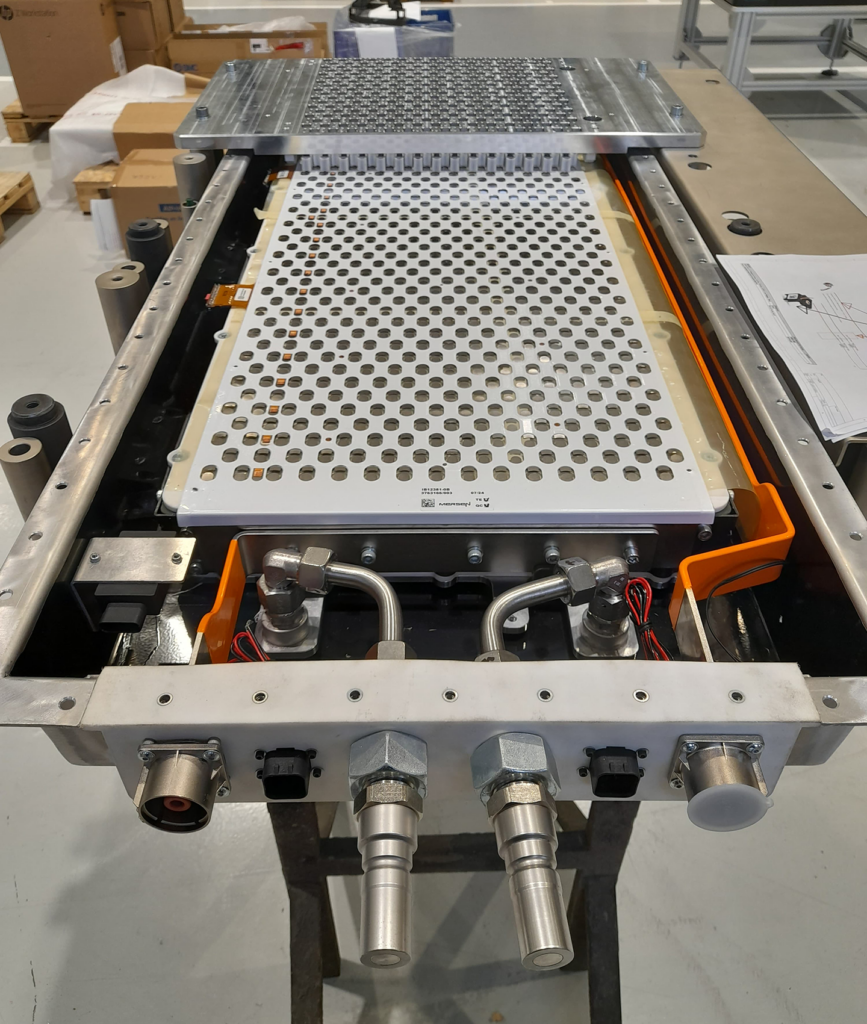
The main goal in MODALT is to study, model, design and prototype a high-performance energy storage module, and its integration to build battery packs for high-power and high-energy electric mobility applications. In particular, MODALT will study and research new cells and materials modelling, characterizing and testing their electric, mechanical and thermal behaviour towards optimizing an advanced casing and isolation design.
MODALT will explore:
- Definition of common battery module properties and configuration for different use cases capable to scale-up battery pack technology to fulfil high-power transport needs and requirements.
- Study and design of a light and safe module case, paying particular attention to its mechanical design (geometry, distribution, connections, wiring, cooling, etc.), and research on the use of advanced composite materials both for the lower case (battery carrier) and upper case (battery lid or cover) on a way they fulfil mechanical requirements, resilience to fire and electromagnetic interference, while enhancing light weight.
- Modelling and evaluation of the module performance and safety, in standard and extreme conditions, by means of computational modelling (thermal modelling with 3D resolution). In order for the model to be accurate, individual cells will be modelled by empirically testing thermal and electrochemical behaviour. Then, at a second stage, this will be scaled-up with a complete battery module will be model being virtually evaluated as in a real vehicle.
- Testing of the pack for safety aspects, taking into account thermal, mechanical and electric validation, paving the way for future certification. Experimental evaluation will be performed for an isolated cell to measure heat transfer and gas evacuation, among other parameters. A kinetic-chemical model will be developed to represent such a phenomenon and virtually evaluate the battery pack performance. Fire mitigation measures in case of failure will be implemented, if required.

Acronym: MODALT
Tittle: Research on high-performance storage for high-power electric mobility
ID: INNEST/2022/153
Budget: 828.194,81 €
Duration: 25 months (01/09/2022 – 30/09/2024)
Programme: Agencia Valenciana de Innovación – Proyectos Estratégicos en Cooperación
Partners: Zeleros (cordinator), Universitat Politècnica de València, Instituto CMT, AIMPLAS – Instituto Tecnológico del Plástico, Ziur Composite Solutions

The summary and results obtained in the project funded by the Valencian Agency for Innovation are shown as follows:
Dossier No
INNEST/2022/153
Total aid awarded
644.871,15 €
Beneficiary Entity
ZELEROS GLOBAL SL
Summary of initial project objectives
MODALT is an industrial research project with the main objective of studying, modeling, designing, and prototyping a high-performance storage module, as well as exploring the integration of these modules into modular battery packs aimed at high-power and high-energy electric mobility applications, with a view to their future development and industrialization.
The project involves a research phase, conducting studies and investigations of cells and new materials, as well as modeling and characterizing electrical, mechanical, and thermal behavior to optimize the design of the enclosure and insulation. This will be achieved through prototyping and carrying out specific laboratory tests (TRL-4) to verify the electrical, thermal, and mechanical properties of the complete module and the modular pack design, ultimately optimizing the final design while ensuring safety and meeting certification requirements for future evolution and industrialization.
Results obtained
As of the time of writing this report, testing on the prototype module is still ongoing due to the small natural delays accumulated during the project, which are affecting the final validation task. The document will be updated upon the completion of the tests. To date, partial data from the tests have been evaluated and compared to the model. The accuracy of the simulation and testing is 93%, which allows, for the small available sample, to confirm the validity of the models and the expected performance of the module and battery pack within the confidence margin of the design developed in the project. Additional testing will be conducted after the project closure as an internal conclusion of the development process at Zeleros and as preparation for a study related to the certification process and modifications for the associated industrialization.
Differential value compared to other market alternatives
A next-generation battery has been developed, designed to offer superior performance compared to current market solutions. This battery stands out for its high power density, allowing for greater energy delivery in a compact space. Its compact and lightweight design facilitates integration into a wide variety of applications, optimizing both space and weight in mobile and stationary systems. It incorporates an optimized cooling system, ensuring efficient thermal management and extending the battery’s lifespan even under high-performance conditions. Additionally, it features a customized Battery Management System (BMS), developed specifically to maximize safety, control, and cell balancing, adapting to the unique needs of each application. The electrical connections have been optimized, ensuring simpler installation and lower internal resistance, which contributes to higher overall energy efficiency. This unique combination of features makes our battery an ideal choice for sectors where power, weight, and reliability are critical.
Commercial interest and proximity to the market
The developed battery has allowed us to achieve performance that meets the requirements of the aviation market, where this design—or adapted designs based on the same cell—could serve as the foundation for installations in eVTOLs, which will be the first segment to electrify within aviation.
Contribution from partners and/or contractors
The project is formed by four internationally recognized entities, consisting of two companies—specifically a PYME (ZELEROS) and a large company (ZIUR Composites)—and two research organizations: a technology center (AIMPLAS) and a university (UPV).
The project is led by ZELEROS as the technological partner, expert in the study of cells, geometries, and use cases for energy storage, as well as in mechanical design for distribution, connections, and cooling, and in electrical validation. ZIUR Composites leads the design of the module’s casing with a focus on safety, in close collaboration with AIMPLAS, which develops lightweight and anti-vibration insulation materials. Finally, UPV leads the computational modeling of the pack and experimental characterization.


